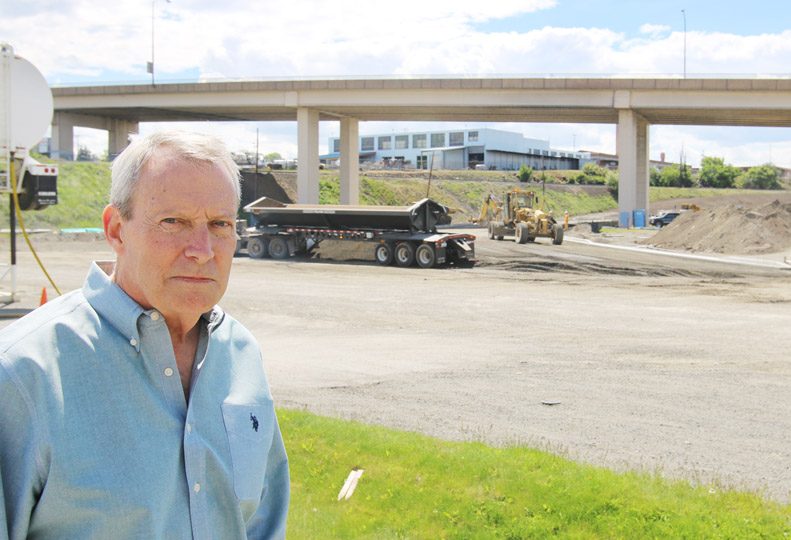
Home » City, Brown Building Materials prepare to meet in court
City, Brown Building Materials prepare to meet in court
Eminent domain meant to clear hurdle for MLK Way

May 25, 2017
An eminent domain case involving the city of Spokane and B-ONE LLC, which operates Brown Building Materials, and pertaining to key property next to the Spokane River near downtown, now is scheduled to go to trial on Oct. 9.
The petition, filed by the city of Spokane, stems from its plans to finish the easternmost portion of Martin Luther King Jr. Way connecting it to north Iron Court and east Front Avenue.
Ronald Brown owns Brown Building Materials, located at 112 N. Erie, immediately east of Iron Court. The city has seized a section of his land on the west edge of his 3-acre property to finish Martin Luther King Jr. Way.
Brown contends the seized area will result in a loss of parking spaces for customers, and more importantly, he believes it will drastically curtail the amount of space semi-trucks have when making deliveries to his business.
“I just don’t think that can be done in a safe and financially reasonable manner,” he says.
Brown says the city first offered $35,000 for the 3,000 square feet of land it wants to connect the new street to Iron and Front. Brown declines to reveal the city’s final offer, but his attorney, Bob Dunn, says it’s “well below $100,000.”
City attorneys and Dunn engaged “two to three years” of negotiations without reaching a settlement, says city of Spokane spokeswoman Marlene Feist. The city filed its eminent domain claim last August.
The city of Spokane has said it hopes to spur private development and economic growth with a $6.9 million extension of Martin Luther King Way, a four-lane route stretching east from Division between the Washington State University Spokane campus and the railroad tracks, from Sherman Street to Trent Avenue. The road also will have an accompanying extension of the Ben Burr Trail, starting this year.
The total cost of the project is expected to be about $15.5 million, court papers say.
Says Feist, “The construction of the extension of Martin Luther King Way is important to the development of the University District for the purpose of giving it a unique and holistic feel. The city feels it’s made fair and reasonable offers out to Mr. Brown.”
Dunn, a partner at Dunn & Black PS, says there aren’t any immediate hearings scheduled in the case.
“We’re just grinding away at discovery right now,” says Dunn, who adds that in his experience, about 90 percent of eminent domain cases end up being settled before trial.
Dunn says neither his office nor the city have yet to finish their respective appraisals of Brown’s property.
“In these cases, typically what we see is that the municipality seizing the property uses a bank’s appraisal as an offer to the landowner,” Dunn says. “That figure, almost all the time, is considerably lower and has nothing to do with fair market value. They search for the most conservative appraisers and bank people they can find.”
He adds, “But when these cases do go to trial, however, the party that’s having their land seized has the right to show a jury the market value of the property in question. It’s the least that can be done, given the fact the government has the authority to take your dirt.”
Brown, at 64, says he’s still undecided as to whether to relocate or stay put.
“It’s not my intention to shut down,” he says.
The company currently operates out of two buildings that have a combined 11,200 square feet of space. The two-story, main building holds the company’s showroom floor, office, and warehouse space. Immediately east of the main building is a 4,000-square-foot structure dedicated solely to warehouse space, Brown says.
Brown’s father, Richard Brown, started Brown Building Materials in 1959. He died last May.
“Dad was a general contractor and demolition man before he started the business,” Brown says. “He couldn’t bring himself to throw anything away.”
Brown Building Materials sells items such as cast iron radiators, railroad ties, and eclectic yard accessories. The company is down to just three full-time employees, Brown says.
“It’s the cost of doing business today. The chain stores and Craigslist have really reduced our business,” Brown says. “But it hasn’t been all bad. With fewer employees, it’s turned into a more lucrative wage for those that are still here.”
While Craigslist contributed to a decline in customers, Brown says the social media site Pinterest has helped drive customers to the business searching for rare and dated items that chain stores don’t have in stock or available online.
“What we’ve learned through the years is that you have to pick where you want to compete,” he says.
Brown says the company isn’t a stranger to uncertainty. Richard Brown initially opened the business before the state later seized the property to build Interstate 90.
Another location caught fire in 2000, which forced Brown to move the store to its current site.
Then, two years ago, nearby road construction in preparation for Martin Luther King Jr. Way began eroding customer traffic to the business.
“I think about this all time,” Brown says of the future of the business. “I just don’t know what’s going to happen.”
Brown says he’s not angry or bitter about the approaching road.
“This is natural. I believe that this is progress for the city and the University District area. But what is frustrating for me, honestly, is that I just feel like I’m not being looked at by the city as to how this has damaged my business,” he says.
Latest News Real Estate & Construction Government
Related Articles
Related Products



![Brad head shot[1] web](https://www.spokanejournal.com/ext/resources/2025/03/10/thumb/Brad-Head-Shot[1]_web.jpg?1741642753)
